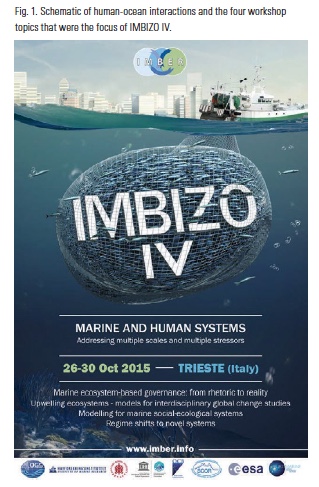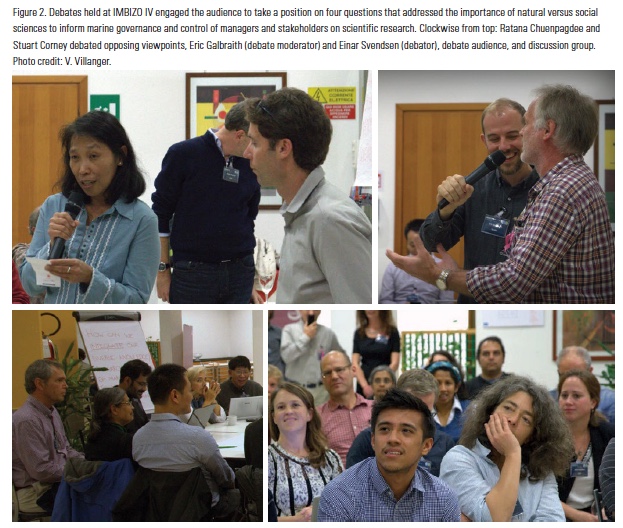Eileen Hofmann (Old Dominion University, Norfolk, VA, USA)
Lisa Maddison (IMBER IPO, Institute of Marine Research, Bergen, Norway)
Ingrid van Putten (CSIRO, Hobart, Tasmania, Australia)
Javier Arístegui (Universidad de Las Palmas de Gran Canaria, Islas Canarias, Spain)
The Integrated Marine Biogeochemistry and Ecosystem Research Project (IMBER) is developed around four research themes, which include: Key interactions in marine ecosystems; sensitivity to global change; feedbacks to the Earth system; and responses of society. When IMBER was initiated in 2005, the responses of society theme represented a new direction for global environmental change programs because it explicitly acknowledged the role of humans as both drivers and recipients of change in marine ecosystems. IMBER project-wide activities, regional programs and working groups have advanced the science associated with each research theme. However, the strength of these activities has been in the identification of theoretical and methodological overlap among the themes, facilitating integration of ideas and synthesis of research outcomes, and highlighting new research directions.

The biennial IMBIZO (Zulu word for a gathering) is an important IMBER-wide activity for assessing current understanding of theoretical and empirical research at the local, regional and global scale, and pointing to future research needs. IMBIZO IV, held in October 2015 in Trieste, Italy, addressed linkages between marine ecosystems and human systems (Fig. 1). In particular, emphasis was on current systems understanding and approaches to predict the effects of multiple stressors, at multiple scales, on marine ecosystems and dependent human populations. A novel aspect of this IMBIZO was the focus on exposing the need for human systems to respond to changes and for governance systems to adequately guide these responses.
IMBIZO IV was developed around four workshops (Fig. 1) that addressed i) marine ecosystem-based governance, ii) upwelling systems as models for interdisciplinary global change studies, iii) integrated modeling to support marine socio-ecological systems under global change, and iv) regime shifts and their socio-ecological implications. Although each workshop had distinct objectives, all addressed aspects of climate, ecosystems and societies with a view towards integrating and synthesizing current understanding and highlighting approaches for developing innovative societal responses to changing marine ecosystems. The workshops were supplemented with plenary presentations that provided overviews of the state of understanding and research needs and joint sessions and debates that allowed cross-workshop interactions (Fig. 2).
Within the context of each workshop, questions were addressed that considered the challenges of multiple stressors, pressures, and drivers, existing knowledge gaps, and the type of expertise needed to move forward. Some workshops also evaluated the need for paradigm shifts to adequately address particular research questions. The overall goal of each workshop was to determine how integration of the diverse array of knowledge and different research outcomes for marine systems could be done to provide useful advice for policy and management.
The results of the individual workshops are being summarized in a variety of ways including white papers, synthesis papers, short communications, and special issues. However, the workshop results have common components with perhaps the clearest message being the need for continued conversations and exchange of information between scientists from different disciplinary backgrounds. To enable this dialogue to take place collaboratively and ultimately to develop workable solutions will mean that a common understanding of language will need to be developed and that jargon be avoided. Facilitating cross-disciplinary communication by domain experts will also help crucially important communication to management authorities and decision makers.
Aside from the need for good communication between scientists that straddle the physical, ecological and human domains, the different workshops considered the linkages and interactions between the driving forces (pressures-state-impacts-responses, DPSIR) and how these are understood and represented. For most marine systems, the system state, how much of what is present and where, can be described with differing degrees of certainty depending on location and factors such as monitoring intensity and accessibility. The connectivity and linkages between marine system components and driving forces are known from a theoretical perspective and for many systems these have been described quantitatively using different modeling approaches. However, there is considerable empirical uncertainty about how marine systems might respond to continued and cumulative anthropogenic stresses and how in turn, this may feed back to the human domain and affect, for instance, future food security.

Marine systems may not be generalizable, sometimes cannot be simply scaled up, or may not respond linearly to anthropogenic stressors. Regime shifts may occur that are not easily (or not at all) reversible, thus requiring adaptation by resource users. The governance system is crucially important in this context as it provides links to management, policy and regulatory systems that influence use of and access to marine resources. Governance institutions are ultimately responsible for the sustainable management of marine resources and any necessary reduction in the pressure exerted on the resources. These governance systems in essence close the loop between the natural and human systems. Natural, socio-economic, and governance systems need to be central to continued research efforts and inform all levels of decision making to ensure informed steps are taken.
Global environmental change is happening and will continue to affect ecosystems and alter the ecosystem services provided to humanity. The need for timely detection and attribution of these changes remains, especially where change is irreversible. Human systems and society at large are both creators of the many stressors that drive change in marine ecosystems as well as recipients of these changes. Human systems can drive positive changes through good governance aimed at reducing vulnerability, and enhancing adaptive capacity and resilience. It is clear that many knowledge gaps remain, in particular the way in which multiple drivers and stressors interact. Much work also remains to be done in further detailing and modeling the crucial dependencies between human and ocean systems. All of these uncertainties place limitations on the predictability of governance outcomes and risk unintended consequences and maladaptation if not addressed adequately. Outcomes from IMBIZO IV will provide guidance for these important research efforts for the next decade of IMBER research.
IMBER gratefully acknowledges the support provided by the OCB Program for IMBIZO IV and its ongoing support of IMBER activities.



